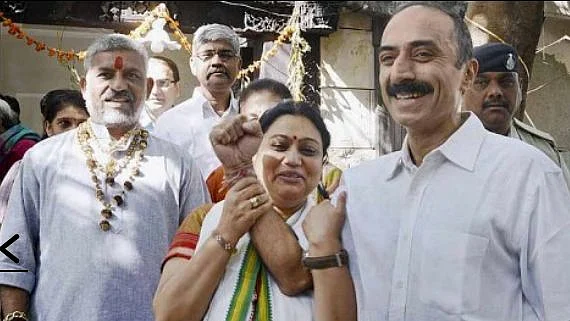‘If IPS Doesn’t Unite Now, When?’ Sanjiv Bhatt’s Wife Shweta Asks
Ex-IPS officer Sanjiv Bhatt has been in hot water for nearly 20 years, since he testified against the Gujarat govt.

advertisement
“To prove a man guilty under IPC 302 is a huge responsibility. You are not only playing with someone’s life but also with the lives of that person’s family too. All I can say is justice was not served,” laments Shweta Bhatt, wife of ex-IPS officer (Gujarat Cadre) Sanjiv Bhatt, who was sentenced to life imprisonment in a 30-year-old custodial torture-death case by a local court in Jamnagar, Gujarat.
Bhatt has been courting controversy for nearly two decades now, not least when he testified to the Nanavati Commission in 2011 against the Gujarat government, particularly the then-chief minister of Gujarat, Narendra Modi. Since then, he has been arrested twice, and suspended from the department on charges of unauthorised leave, which led to his dismissal in 2015.
On 5 September 2018, Bhatt was arrested for allegedly framing a lawyer for possession of drugs, when he was posted in Banaskantha district in April 1996 as the Superintendent of Police and was lodged in Palanpur Sub-Jail. Shweta Bhatt spoke to The Quint at length about how she believes the legal system has been used to denied her husband justice.
The Custodial Torture-Death Case
Shweta Bhatt told The Quint that for nearly nine months, she has been running from pillar to post to secure her husband’s bail in the drugs-planting case, which made his defence in the custodial torture-death case difficult.
According to Shweta, the custodial torture-death case was revived in 2011 after the Gujarat government suddenly granted sanction for his prosecution after having earlier refused to grant it. The state government had filed applications in the Gujarat courts to prevent any prosecution back in 1995, but withdrew these in 2011, allowing the trial to proceed.
Shweta told The Quint that there was little factual basis to prosecute Sanjiv for Vaishnani’s death following his arrest after riots in Jam-Jodhpur, Gujarat in October 1990. Bhatt was accused of torturing Vaishnani while he was in custody, which caused his death after he was released.
She told The Quint that on the fateful day when rioting broke out in Jam-Jodhpur town of Jamnagar in October 1990, Sanjiv did not arrest the 133 rioters.
Shweta says,
According to Shweta, Vaishnani – who died 10 days after his release – didn’t have any internal or external bruises. She says there are written affidavits filed by witnesses in 1990 which can corroborate this claim. She also claims that the police failed to bring forward witnesses to prove the victim was actually tortured, or that he in fact died of renal failure as claimed by Vaishnani’s brother.
She also said that the prosecution failed to produce any witness to support the brother’s claims:
'Prosecution Didn’t Hand Over Documents They Were Legally Obligated to Provide’
Shweta also claims that the prosecution didn’t provide them with crucial documents needed to mount a proper defence, which they are obliged to do as per the law. The police allegedly claimed that most of these were 'destroyed'.
Shweta claims that the production report, Investigation Report by CID Crime, reports by jail doctors and the jail superintendent are some of the many documents the prosecution failed to provide.
This included, she says, Prabhudas Vaishnani’s inmate report when he was released from jail, which Sanjiv's lawyer had specifically asked for because of how important it was to a case like this, in which the victim was alleged to have died because of custodial torture.
“The inmate’s report would have mentioned if Vaishnani faced any problems, torture, injuries etc, whether he had any marks on his body before he entered the jail and after he exited the jail. We asked for this report and we were told that it too got destroyed. All documents that go in our favour are missing,” she added.
The Witnesses Who Were Not Examined
Shweta alleges that although the prosecution claimed they had 300 witnesses in the Jamnagar custodial death case, the prosecutor only called around 30.
Shweta has also alleged that the court did not allow their lawyer to call a medico-legal expert to testify in the case.
On Sanjiv's behalf, Shweta approached the Gujarat High Court and the Supreme Court, asking them to direct the examination of at least some of the 300 witnesses who were not examined in the sessions court.
Although Shweta has received several calls from Sanjiv Bhatt’s peers, she feels that the IPS association should step up and support him publicly.
Shweta will now appeal in the Gujarat High Court.
(At The Quint, we question everything. Play an active role in shaping our journalism by becoming a member today.)